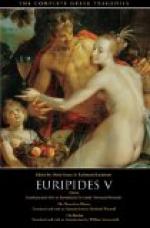P. 6, l. 62, Children to our enemy.]—Cf. 626. Soph. El. 589. They do not seem to be in existence at the time of the play.
Pp. 5-6.]—Electra’s first two speeches are admirable as expositions of her character—the morbid nursing of hatred as a duty, the deliberate posing, the impulsiveness, the quick response to kindness.
P. 7, l. 82, Pylades.]—Pylades is a persona muta both here and in Sophocles’ Electra, a fixed traditional figure, possessing no quality but devotion to Orestes. In Aeschylus’ Libation-Bearers he speaks only once, with tremendous effect, at the crisis of the play, to rebuke Orestes when his heart fails him. In the Iphigenia in Tauris, however, and still more in the Orestes, he is a fully studied character.
P. 10, l. 151, A swan crying alone.]—Cf. Bacchae, p. 152, “As yearns the milk-white swan when old swans die.”
P. 11, ll. 169 ff., The Watcher hath cried this day.]—Hera was an old Pelasgian goddess, whose worship was kept in part a mystery from the invading Achaeans or Dorians. There seems to have been a priest born “of the ancient folk,” i.e., a Pelasgian or aboriginal Mycenaean, who, by some secret lore—probably some ancient and superseded method of calculating the year—knew when Hera’s festival was due, and walked round the country three days beforehand to announce it. He drank “the milk of the flock” and avoided wine, either from some religious taboo, or because he represented the religion of the milk-drinking mountain shepherds.
P. 13, ll. 220 ff.]—Observe Electra’s cowardice when surprised; contrast her courage, p. 47, when sending Orestes off, and again her quick drop to despair when the news does not come soon enough.
P. 16, ll. 247 ff., I am a wife.... O better dead!]—Rather ungenerous, when compared with her words on p. 6. (Cf. also her words on pp. 24 and 26.) But she feels this herself, almost immediately. Orestes naturally takes her to mean that her husband is one of Aegisthus’ friends. This would have ruined his plot. (Cf. above, p. 8, l. 98.)
P. 22, l. 312, Castor.]—I know no other mention of Electra’s betrothal to Castor. He was her kinsman: see below on l. 990.
Pp. 22-23, ll. 300-337.]—In this wonderful outbreak, observe the mixture of all sorts of personal resentments and jealousies with the devotion of the lonely woman to her father and her brother. “So men say,” is an interesting touch; perhaps conscience tells her midway that she does not quite believe what she is saying. So is the self-conscious recognition of her “bitter burning brain” that interprets all things in a sort of distortion.—Observe, too, how instinctively she turns to the peasant for sympathy in the strain of her emotion. It is his entrance, perhaps, which prevents Orestes from being swept away and revealing himself. The peasant’s courage towards two armed men is striking, as well as his courtesy and his sanity. He is the one character in the play not somehow tainted with blood-madness.




